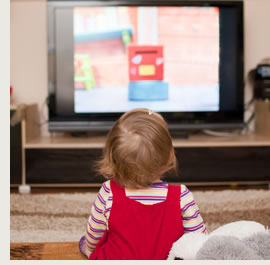|
|
||||
|
||||
| TV | ||||
| by Sophie Cross | ||||
|
The prevalence of DSs, iPads, computers, Playstations and other interactive gaming devices also mean that children are increasingly watching TV shows on other devices as well as the family TV and are now exposed and interacting with content that is most likely well beyond their years. As with everything it seems, children are no longer satisfied with programs designed for their age, preferring programs for kids much older than they are. This is of course particularly likely in households with a number of children of different ages, when the smaller ones just end up watching what the older ones are watching. Has it always been so? Yes, most likely, but in previous generations, you basically watched what you watched on TV in the living room within earshot of your parents and if anything dodgy came on, you were told to turn it over or turn it off. There weren't all these other gadgets with Internet capability for hours of watching TV shows, music videos and strange enactments of Barbie stories on YouTube. So is this ageing up of TV content watched by our children having a bad effect on them? Who knows for sure but I remember my little girl getting into Hanna Montana and Victorious at around 6 and I swear she got more whiny and screechy as a result! Now having moved and without Disney Channel, she watches slightly less of the bratty hysterical teenager stuff and I think she's calmed down. But while Disney Channel teen programs might be incredibly annoying, they are violence free, unlike many of the games they play on their DSs or shows they watch on the TV or YouTube. With shootings of kids, by kids in the USA and speculation on the effects of violent TV and computer games on kids, the subject of media influence is very hot right now. Does violence or aggression on TV have a negative effect on children's behaviour and can it be reversed? That's what a recent study published in the journal Pediatrics and reported in the New York Times, set out to determine and recently revealed the results of a program designed to limit the exposure of preschool children to violence-laden videos and television shows and increase their time with educational programming that encourages empathy. The study found that the experiment reduced the children's aggression toward others, compared with a group of children who were allowed to watch whatever they wanted. The new study was a randomized trial, rare in research on the effects of media on children. The researchers, at Seattle Children's Research Institute and the University of Washington, divided 565 parents of children ages 3 to 5 into two groups. Both were told to track their children's media consumption in a diary that the researchers assessed for violent, didactic and "pro-social" content, which they defined as showing empathy, helping others and resolving disputes without violence. The control group was given advice only on better dietary habits for children. The second group of parents were sent program guides highlighting positive shows for young children. They also received newsletters encouraging parents to watch television with their children and ask questions during the shows about the best ways to deal with conflict. The parents also received monthly phone calls from the researchers, who helped them set television-watching goals for their pre-schoolers. The researchers surveyed the parents at six months and again after a year about their children's social behaviour. After six months, parents in the group receiving advice about television-watching said their children were somewhat less aggressive with others, compared with those in the control group. The children who watched less violent shows also scored higher on measures of social competence, a difference that persisted after one year. "The take-home message for parents is it's not just about turning off the TV; it's about changing the channel," said Dr. Dimitri A. Christakis, the lead author of the study and a professor of pediatrics at the University of Washington. "We want our children to behave better," Dr. Christakis said, "and changing their media diet is a good way to do that." The new study has limitations, experts noted. Data on both the children's television habits and their behavior was reported by their parents, who may not be objective. And the study focused only on media content in the home, although some preschool-aged children are exposed to programming elsewhere. However it's not all as simple as that. Preschoolers in particular are less developed in their understanding of situations and messages and even "educational programming" with messages of empathy can be misunderstood, with negative consequences. A study published online in November in The Journal of Applied Developmental Psychology found that preschoolers shown educational media were more likely to engage in certain forms of interpersonal aggression over time. So as with all parenting, nothing's ever cut and dry and simple. But at the end of the day, it really boils down to common sense doesn't it?
|
|
|||||||||

 It's no surprise that parents are increasingly resorting to the TV to entertain the kids while they work at home, do the chores, make dinner, relax after work etc etc. And despite calls to limit TV time and go back to old school children's activity such as reading, playing games or playing in the garden, it seems kids are watching more TV than ever before, and the quality is not good.
It's no surprise that parents are increasingly resorting to the TV to entertain the kids while they work at home, do the chores, make dinner, relax after work etc etc. And despite calls to limit TV time and go back to old school children's activity such as reading, playing games or playing in the garden, it seems kids are watching more TV than ever before, and the quality is not good. Sophie Cross is a public relations consultant and writer who has publicised and written about everything from makeup to The Muppets, child care to celebrity chefs and perfume to Partners in Population and Development! Originally from the UK and as a languages graduate she has worked around the world, living in Australia for the last 11 years where she runs, PR Chicks.
Sophie Cross is a public relations consultant and writer who has publicised and written about everything from makeup to The Muppets, child care to celebrity chefs and perfume to Partners in Population and Development! Originally from the UK and as a languages graduate she has worked around the world, living in Australia for the last 11 years where she runs, PR Chicks.